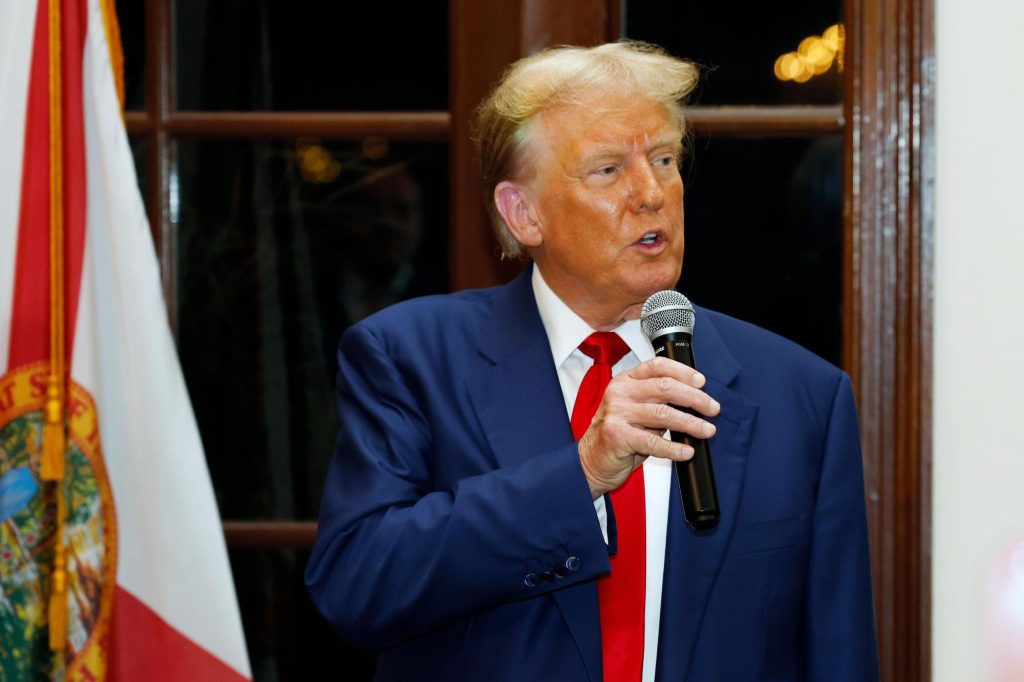By MICHAEL R. SISAK and JENNIFER PELTZ (Associated Press)
NEW YORK (AP) — Donald Trump put up a $175 million bond on Monday to stop the state from seizing his assets to pay the more than $454 million he owes while he appeals the civil fraud case in New York, according to a court filing.
A New York appellate court had given the former president 10 days to put up the money after a panel of judges agreed last month to reduce the amount needed to halt enforcement.
The bond Trump posted is essentially a temporary guarantee of payment if the judgment is upheld. If he wins the appeal, he will get his money back and won't owe anything to the state.
“As promised, President Trump has posted bond. He looks forward to vindicating his rights on appeal and overturning this unjust verdict,” said one of Trump’s lawyers, Alina Habba.
Until the appeals court intervened to lower the required bond, New York Attorney General Letitia James had been prepared to seek the judgment, possibly by seizing some of Trump’s key properties. James, a Democrat, brought the lawsuit on the state’s behalf. Her office declined to comment Monday.
The court decided to lower the required bond after Trump’s lawyers argued it was “a practical impossibility” to get an underwriter to sign off on a bond for the $454 million, plus interest, that he owes.
The company that underwrote the bond is Knight Specialty Insurance, which is part of the Knight Insurance Group. Billionaire Don Hankey, the chairman of that company, stated that cash and bond were used as collateral for Trump’s appellate bond.
“This is what we do at Knight Insurance, and we’re happy to do this for anyone who needs a bond,” said Hankey, who is best known in the business world for making high-risk, high-interest loans to car buyers with flawed credit histories.
Trump is fighting to overturn a judge’s Feb. 16 finding that he lied about his wealth as he built the real estate empire that propelled him to stardom and the presidency. The trial focused on how Trump’s assets were valued on financial statements provided to lenders and insurers.
Trump denies any wrongdoing, stating that the statements actually underestimated his fortune, were accompanied by disclaimers, and were not taken at face value by the institutions that lent to or insured him.
The state courts’ Appellate Division has indicated that it would hear arguments in September, falling in the final weeks of the presidential race if the schedule holds.
Filing an appeal in New York generally does not halt enforcement of a judgment, but there is an automatic pause if the person obtains a bond guaranteeing payment of what’s owed.
Courts sometimes make special allowances and reduce the required amount for a stay, like in the case of Trump.
Trump’s attorneys informed the appeals court that over 30 bonding companies were unwilling to accept a combination of cash and real estate as collateral for a bond totaling more than $454 million. The underwriters insisted on only cash, stocks, or other easily convertible assets, according to the attorneys.
They mentioned that most bonding companies demand collateral equal to 120% of the owed amount.
Trump recently stated that he has nearly half a billion dollars in cash, in addition to billions of dollars' worth of real estate and other assets. He expressed a desire to keep some cash accessible for his presidential run.
Recent legal debts have significantly reduced Trump’s cash reserves.
Apart from the $175 million he was required to provide in the New York case, Trump has posted a combination of bond and cash exceeding $97 million to cover the money owed to writer E. Jean Carroll while he contests the verdicts in two federal civil trials. Juries determined that he sexually assaulted her in the 1990s and defamed her when she made the allegation public in 2019. Trump denies all the allegations.
In February, Trump settled the $392,638 in legal fees that a judge had instructed him to pay to The New York Times and three reporters after he unsuccessfully sued them over a Pulitzer Prize-winning 2018 story about his family’s wealth and tax practices.
In March, a British court instructed Trump to pay legal fees of 300,000 pounds ($382,000) to a company he unsuccessfully sued over the so-called Steele dossier that contained scandalous claims about him. Trump stated that those claims were untrue.
Trump may eventually generate funds by selling some of the almost 60% of stock he holds in his newly public social media company, Trump Media & Technology Group — but this would be a longer-term strategy. Trump’s stake could be worth billions of dollars, but a “lock-up” provision prohibits insiders like him from selling their shares for six months.
By MICHAEL R. SISAK and JENNIFER PELTZ (Associated Press) NEW YORK (AP) — Donald Trump provided a $175 million bond on Monday in his New York civil fraud case, preventing the state from seizing his assets to settle the debt while he appeals the more than $454 million he owes. This action halted the collection of the debt.









